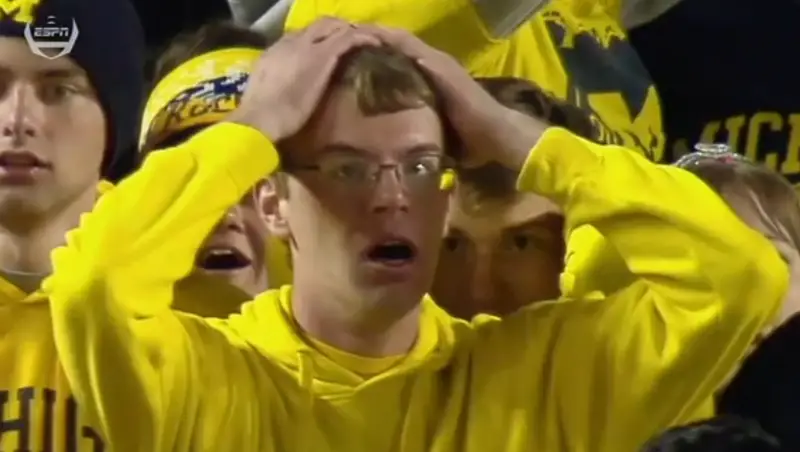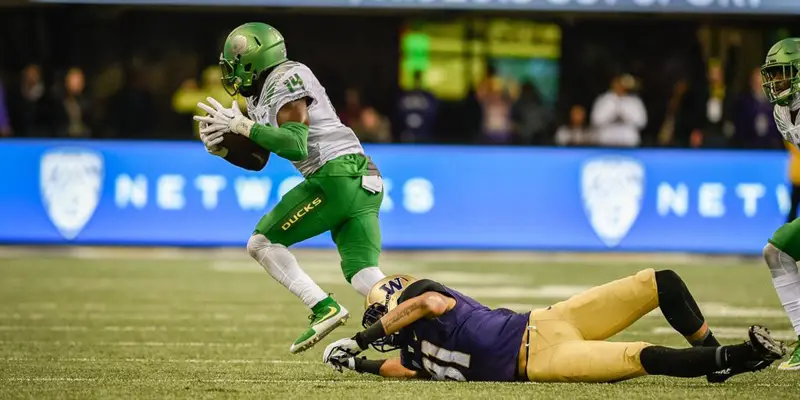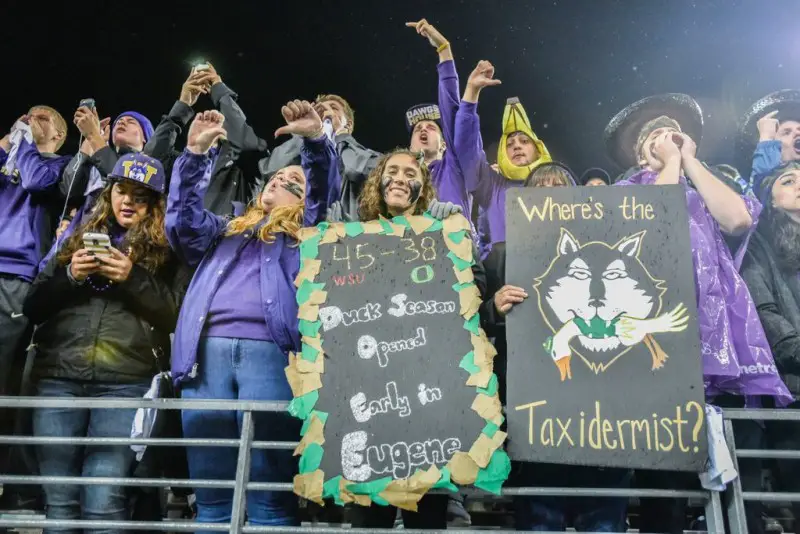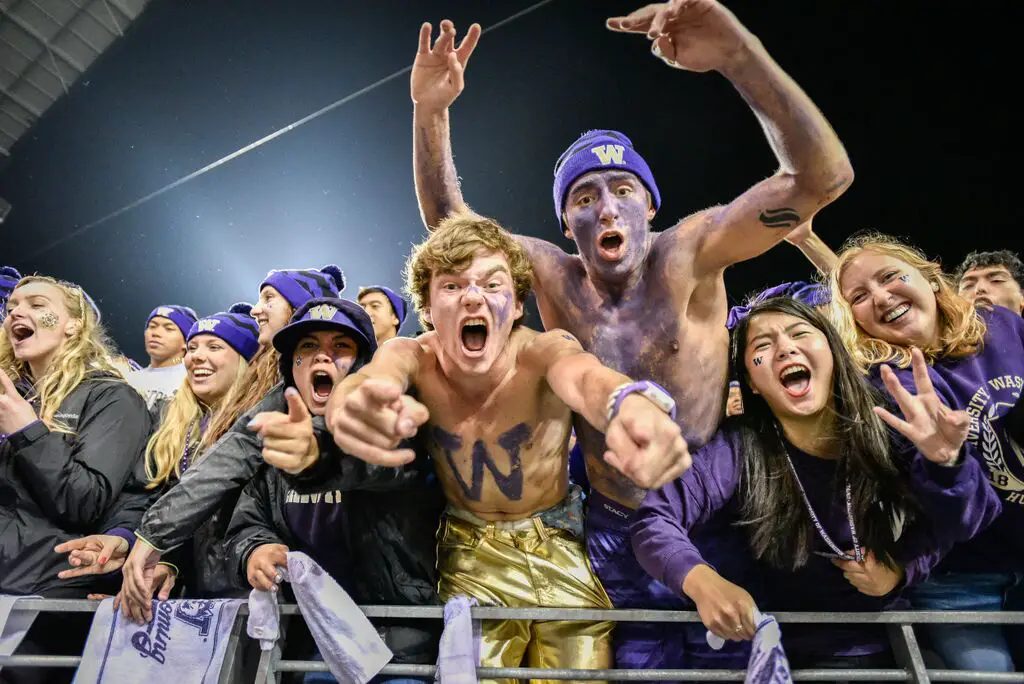Sitting at breakfast Saturday morning, an older Oregon fan gave me a hearty “Go Ducks!” as he walked by. Then he approached me, leaned in, and with the protracted delivery that lets one know that wisdom is about to be dispensed, he whispered, “… but I don’t think we’re going to win today.”
I told him that I couldn’t say for sure who will win, but I also wouldn’t be surprised if he was right. I had no feel for Saturday’s game, with an anxious sense of dread being buoyed by cautious optimism.
While Oregon had struggled at times to provide examples in recent weeks of why we should believe in them, the overwhelming public sentiment that the Ducks were going to lose to Washington seemed irrationally certain; that Oregon’s time had passed and it was time for the streak to end.
College GameDay even devoted a segment to whether Oregon had reached the end of its run.
The Ducks have had their share of erratic moments this season, but for all their talent and recent success — they did play in the National Championship Game last year, after all — nothing could be considered certain, not even a Washington victory.
That uncertainty may be difficult to endure as a fan, especially after years of near-certain results from the Ducks, but it’s also the reason why it was foolish to assume any outcome one way or the other.
I spent all week wondering how Oregon’s game against the Huskies would go, and then felt certain the Ducks would win the moment this happened:
Having slept on it, we now ask, is this the craziest finish you’ve ever seen?
Incredible. Absolutely incredible! Brought to you by @GrubHub. http://t.co/Tp1sXNvPm8
— Big Ten Network (@BigTenNetwork) October 17, 2015
— Big Ten Network (@BigTenNetwork) October 18, 2015
The most enduring image of that play (other than Jim Harbaugh’s “I just vomited in my mouth” face) was that of a stunned Michigan fan following the final play:

Michigan fans weren’t alone in being stunned by the shocking end to their game against Michigan State Saturday.
This image tells us everything we need to know about the mindset of the Michigan collective. The game wasn’t supposed to end that way, and not just because we just witnessed an absolutely bonkers play.
It was more than that.
We see a look of disbelief because the outcome was certain; a look of expectation indicating the game was intended less as a contest and more of a coronation that would announce Michigan’s return to prominence.
Everything they had witnessed for the 59 minutes and 59 seconds prior had done nothing to change the accuracy of that narrative.
Uncertain about how last Saturday’s game would go, I spent last week thinking about what the streak over Washington meant.
There is a prevailing assumption amongst the Husky collective that Oregon’s success over Washington is cyclical, and eventually the Huskies will dominate the Ducks, and the hierarchy of the two teams will return to “normal.”
Washington fans will point to their (split) national championship and Oregon’s lack of one as a sign of a cyclical inversion of the teams’ places in the power structure.
For Ducks fans, every win in the streak represents an argument against those days returning; a compounding reminder that this is the new normal.
Because of the long histories of traditionally successful programs such as Michigan and Washington, there is always an assumption that a return to success is inevitable; an issue not of “if”, but “when.”
Whenever they experience a slight uptick, it is viewed as a sign of a return to prominence. For their less traditional rivals, Michigan State and Oregon, any regression is viewed as the beginning of the end.
There’s an inevitability assumed that the past hierarchy will always return, and the burden of any other narrative is placed on the less traditional programs.
For Michigan, it didn’t matter that Michigan State had won six of the previous seven games in the rivalry, to them it was a result of Michigan being down, not Michigan State being up.
It didn’t matter that the Spartans were undefeated, they almost lost to Rutgers the week before. Now College GameDay was in town, the Wolverines hadn’t allowed a point in more than 40 defensive possessions, and were getting the same odds as Alabama at winning a national championship.
Michigan was (supposed to be) back.
For Washington, Saturday’s game was viewed as their time. All streaks eventually end, and this year felt like everything coming together for the Huskies to finally get that win against the Ducks. Washington was a two-point favorite.
The Huskies possessed a top-20 defense and Oregon was experiencing greater offensive struggles than it had at nearly any point during the streak. The entire College GameDay crew picked the Huskies to win.
Last week, Oregon lost at home to Washington State, while Washington not only won at USC, but the Thursday night game gave them two extra days of rest. The game was in Seattle, at night, and a sellout. Every factor was working in Washington’s favor.
Victory for Washington was certain … and then it wasn’t.
Vernon Adams returned, as did Darren Carrington, and viola, the offense resembled one Oregon fans were far more familiar with. The much-maligned defense made plays when it had to in the end and preserved the win.
The streak over Washington now stands at 12, the longest winning streak the Ducks have had over any Pac-12 school in the program’s history.
The Ducks now head into their bye week looking to render one more certainty null and void.
Oregon has alternated wins and losses all season long. Breaking that pattern against Arizona State would go a long way toward getting the Ducks back into contention in what is expected to be an unpredictable and uncertain Pac-12 North.
Top image by Kevin Cline
Related Articles:
Why Oregon Football Always Belongs in the National Conversation
The B1G Won the 2026 Coaching Carousel...Big-Time!
Continuity? Lanning's Hiring Success is Put to the Test
Why Whether Dyer Was Down or Not...Doesn't Matter
How to Analyze Football Talent Like a Pro
Some Thoughts as the Football Withdrawals Kick In
Nathan Roholt is a senior writer and managing editor emeritus for FishDuck. Follow him on Twitter @nathanroholt. Send questions/feedback/hatemail to nroholtfd@gmail.com.



